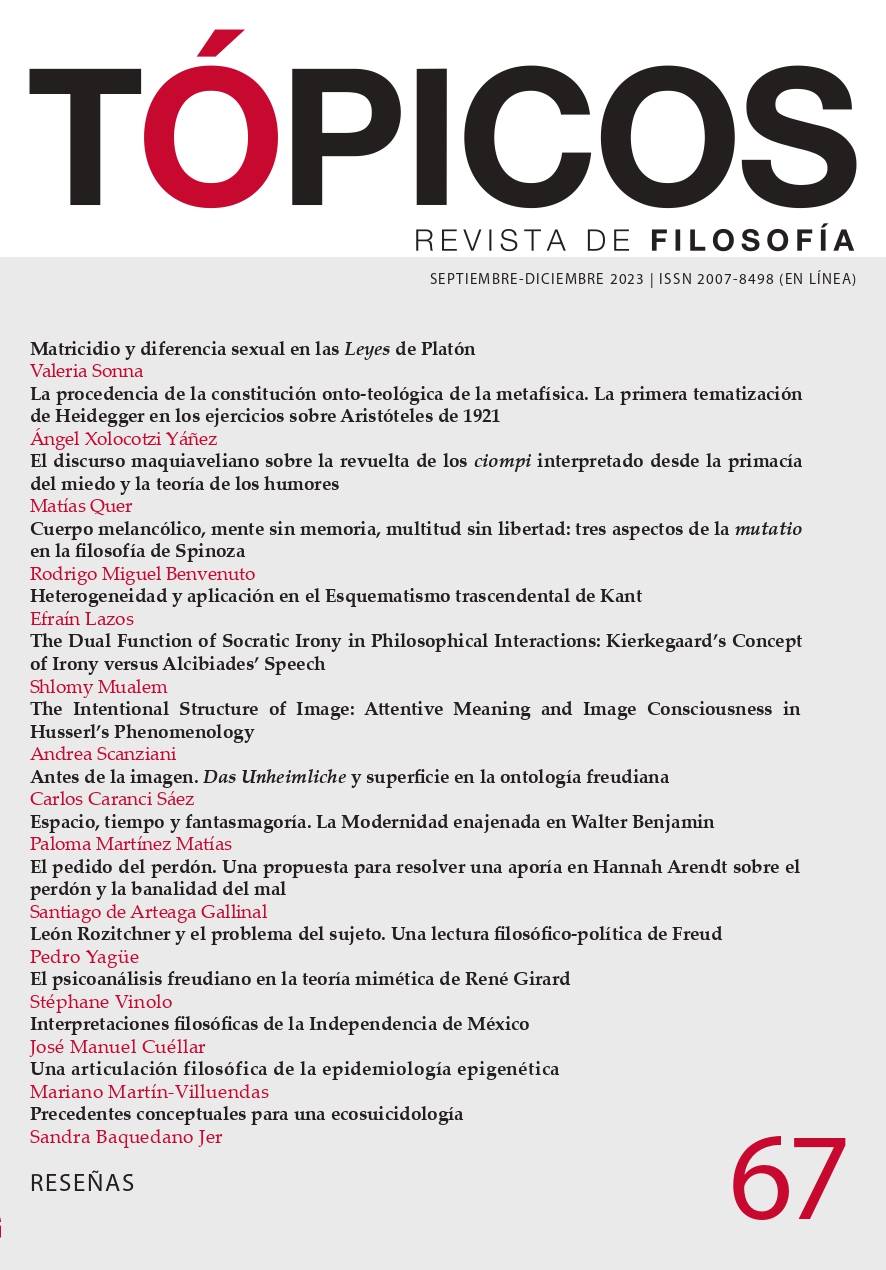La doble función de la ironía socrática en las interacciones filosóficas: el concepto de “ironía” de Kierkegaard frente al discurso de Alcibíades
Publicado 2023-08-01
Palabras clave
- ironía,
- ironía socrática,
- interacción filosófica,
- Sócrates,
- Platón
- Kierkegaard,
- Alcibíades ...Más
Derechos de autor 2023 Tópicos, Revista de Filosofía

Esta obra está bajo una licencia internacional Creative Commons Atribución-NoComercial-SinDerivadas 4.0.
Cómo citar
Resumen
Este artículo explora la ironía socrática tal y como se refleja en los famosos pasajes del discurso de Alcibíades en el Banquete de Platón, centrándose en la relación entre el enunciado irónico y el proceso de orientación filosófica. Repasando los diversos significados del término eirôneia en la comedia y la filosofía griegas, examino el modo en que Platón emplea la ironía para modelar la figura de Sócrates y describir el ideal de la orientación filosófica como el “arte de la partería.” Después analizo la percepción más positiva que Kierkegaard tiene de la ironía socrática como elemento metódico necesario en el proceso mayéutico socrático de “engañar para llegar a la verdad.” Contrastando a Kierkegaard con la crítica mordaz de Alcibíades, leo a este último desde una perspectiva dramático-filosófica, presentando la ironía como un fenómeno antifilosófico que conduce al desconcierto cognitivo y a la irracionalidad dionisíaca. La postura negativa de Alcibíades se manifestará analizando el uso que hace de cuatro recursos retóricos literarios: comparar a Sócrates con los silenos, establecer una analogía entre el discurso irónico y el tocar la flauta del sátiro Marsias, simbolizar la filosofía como veneno de serpiente y presentar la escena de la seducción de Sócrates como ironía dramática. La discusión muestra, pues, que hay dos manifestaciones distintas de la ironía socrática extraídas de los escritos de Platón, la destructiva y la constructiva, derivadas del carácter de sus alumnos filosóficos.
Referencias
- Allen, R. E. (1959). Anamnesis in Plato’s Meno and Phaedo. The Review of
- Metaphysics, 13(1), 165-174.
- Aristophanes. (1998). Aristophanes I: Clouds, Wasps, Birds. P. Meineck (trans.). Hackett.
- Aristotle. (1926a). Art of Rhetoric. J. H. Freese (trans.). Loeb Classical Library. Heinemann.
- Aristotle. (1926b). Nicomachean Ethics. H. Rackham (trans.). Loeb Classical Library. Heinemann.
- Boy-Stones, G. & Rowe, C. (2013). The Circle of Socrates: Reading in the First-Generation Socratics. Hackett.
- Corey, D. (2015). The Sophists in Plato’s Dialogues. SUNY Press.
- Diels, H. & Kranz, W. (1974). Die Fragmente der Vorsokratiker. Three volumes. Weidmann.
- Freeman, K. (1970). Ancilla to the Pre-Socratic Philosophers: A Complete Translation of the Fragments in Diels, Fragmente der Vorsokratiker. Harvard University Press.
- Friedlander, P. (1958). Plato: An Introduction. Princeton University Press.
- Guthrie, W. K. G. (1971). Socrates. Cambridge University Press.
- Hackforth, R. (1933). Great Thinkers. (I) Socrates. Philosophy, 8(31), 259-72.
- Helfer, A. (2017). Socrates and Alcibiades: Plato’s Drama of Political Ambition and Philosophy. University of Pennsylvania Press.
- Johansson, V. (2019). Pedagogy and Polyphonic Narrativity in Søren Kierkegaard. The Journal of Aesthetic Education, 53(4), 111-122.
- Kierkegaard, S. (1941). Concluding Unscientific Postscript. D. F. Swenson & W. Lowrie (trans.). Princeton University Press.
- Kierkegaard, S. (1967). Søren Kierkegaard’s Journals and Papers. Volume 1. H. V. Hong and E. H. Hong (trans.). Indiana University Press.
- Kierkegaard, S. (1989). The Concept of Irony. H. V. Hong & E. H. Hong (trans.). Princeton University Press.
- Kierkegaard, S. (2007). Kierkegaard’s Journals and Notebooks. Volume 1: Journals AA-DD. B. H. Kirmmse, N. J. Cappelørn, A. Hannay, G. Pattison, & J. Stewart (eds. and trans.). Princeton University Press.
- Lane, M. (2010). Reconsidering Socratic Irony. In G. F. Ferrari (ed.), The Cambridge Companion to Socrates. (pp. 237-259). Cambridge University Press.
- Levinas, E. (1985). Ethics and Infinity. R. A. Cohen (trans.). Duquesne University Press.
- Lippitt, J. (2000). Humour and Irony in Kierkegaard’s Thought. Springer.
- Littman, R. J. (1970). The Loves of Alcibiades. Transactions and Proceedings of the American Philological Association, 101, 263-276.
- Lutz, J. M. (2018). [Review of the book Socrates and Alcibiades: Plato’s Drama of Political Ambition and Philosophy, by Ariel Helfer]. The Review of Politics, 80(2), 378.
- Moore, C. (2019). Brill’s Companion to the Reception of Socrates. Brill.
- Morrison, D. (2007). The Utopian Character of Plato’s Ideal City. In G. F. Ferrari (ed.), The Cambridge Companion to Socrates. (pp. 232-255). Cambridge University Press.
- Nietzsche, F. (2005). Twilight of the Idols. R. Polt (trans.). Hackett.
- Oppian. (1928). Oppian. Colluthus. Tryphiodorus. A. W. Mair (trans.). Loeb Classical Library. Heinemann.
- Plato. (1928). Theaetetus. Sophist. H. N. Fowler (trans.). Loeb Classical Library. Heinemann.
- Plato. (1929). Timaeus. Critias. Cleitophon. Menexenus, Epistles. R. G. Bury (trans.). Loeb Classical Library. Heinemann.
- Plato. (2013a). Republic. I. Books 1-5. C. Emlyn-Jones & W. Preddy (trans.). Loeb Classical Library. Harvard University Press.
- Plato. (2013b). Republic. II. Books 6-10. C. Emlyn-Jones & W. Preddy (trans.). Loeb Classical Library. Harvard University Press.
- Plato. (2017). Euthyphro. Apology. Crito. Phaedo. C. Emlyn-Jones (trans.). Loeb Classical Library. Harvard University Press.
- Plato. (2022). Lysis. Symposium. Phaedrus. C. Emlyn-Jones & W. Preddy (trans.). Loeb Classical Library. Harvard University Press.
- Press, G. H. (1993). Plato’s Dialogues. Rowman & Littlefield.
- Rosen, S. (1994). The Quarrel between Philosophy and Poetry. Routledge.
- Stewart, J. (2015). Søren Kierkegaard: Subjectivity, Irony, & the Crisis of Modernity. Oxford University Press.
- Söderquist, B. (2013). Irony. In J. Lippitt & G. Pattison (eds.), The Oxford Handbook of Kierkegaard. (pp. 344-365). Oxford University Press.
- Söderquist, A. S. (2016). Kierkegaard on Dialogical Education: Vulnerable Freedom. Lexington Books.
- Vlastos, G. (1987). Socratic Irony. Classical Quarterly, 37(1), 79-96.
- Vlastos, G. (1991). Socrates: Ironist and Moral Philosopher. Cornell University Press.
- Wolfsdorf, D. (2007). The Irony of Socrates. Journal of Aesthetics, 65(2), 175-187.





